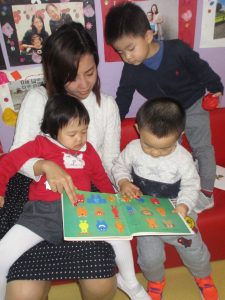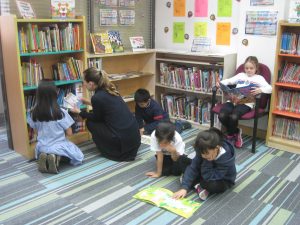Written by John McEnhill (Primary Curriculum Coordinator)
 This week we are celebrating a love of reading through our annual Book Week. Developing an appreciation of books and reading is one of the most important things you can do to help your child do at home, to aid them in their learning. In this article we look at ways you can do this.
This week we are celebrating a love of reading through our annual Book Week. Developing an appreciation of books and reading is one of the most important things you can do to help your child do at home, to aid them in their learning. In this article we look at ways you can do this.
- Share books with your children: Hear your children read, but also read to them. This enables them to access texts which are above their reading level, which might be more interesting. Hearing these texts will develop their vocabulary, and spur them on to continue reading so they can one day access these texts on their own. Read fun books, exciting books and adventurous books. Make this a routine, and make it fun: a bonding time for you and your child to look forward to.
 Don’t have your children reading texts which are too difficult: Children should be able to read 95% of words on a page fluently and without difficulty. If they are struggling to break down individual words, the text is likely too hard for them. Reading texts where the individual words are too hard is discouraging, and inhibits the development of key skills such as understanding of plot, making predictions, and making inferences.
Don’t have your children reading texts which are too difficult: Children should be able to read 95% of words on a page fluently and without difficulty. If they are struggling to break down individual words, the text is likely too hard for them. Reading texts where the individual words are too hard is discouraging, and inhibits the development of key skills such as understanding of plot, making predictions, and making inferences. Children should have the opportunity to read in their home language: Skills such as those listed above can be developed in any language. While it is important that children read in English and Chinese, this should not be to the exclusion of their home language, especially if their proficiency in a language other than English or Chinese exceeds their proficiency in the languages of the school. Developing reading skills in their native language will not hinder children’s ability to read in English or Chinese— it will help!
Children should have the opportunity to read in their home language: Skills such as those listed above can be developed in any language. While it is important that children read in English and Chinese, this should not be to the exclusion of their home language, especially if their proficiency in a language other than English or Chinese exceeds their proficiency in the languages of the school. Developing reading skills in their native language will not hinder children’s ability to read in English or Chinese— it will help!- Let them choose what they read: Graphic novels, comics, and magazines all foster reading skills and allowing choice goes a long way to fostering life-long readers. Provide children with a variety of options: surround them with different reading materials.
- Be a model: Make sure that your children observe you reading on a regular basis. What you read is not important — when your child sees you reading recipes, magazines, newspapers, books, telephone directories, and other reading materials, it will reinforce the importance of reading.
Speak to the library staff, or your child’s class teacher, if you need recommendations for exciting, engaging reading material for your child and you to share. Click here to see a list of books to get you started.